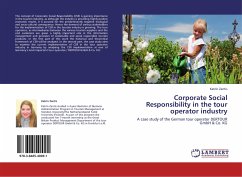The concept of Corporate Social Responsibility (CSR) is gaining importance in the tourism industry, as although the industry is providing highly positive economic results, it is accused for the predominantly negative ecological and socio-cultural consequence. Hence the demand of various stakeholders for the implementation of CSR in the tourism industry is growing. The tour operators, as intermediaries between the various tourism suppliers and the end customers are given a highly important role in the information management and provision of sustainable and social responsible tourism products. In the first part of this work the historical and theoretical framework of CSR will be analysed. In the second part, the case study aims to examine the current implementation of CSR in the tour operator industry in Germany by analysing the CSR implementation at one of Germany¿s most important tour operators ¿DERTOUR GmbH & Co. KG¿.
Hinweis: Dieser Artikel kann nur an eine deutsche Lieferadresse ausgeliefert werden.
Hinweis: Dieser Artikel kann nur an eine deutsche Lieferadresse ausgeliefert werden.








